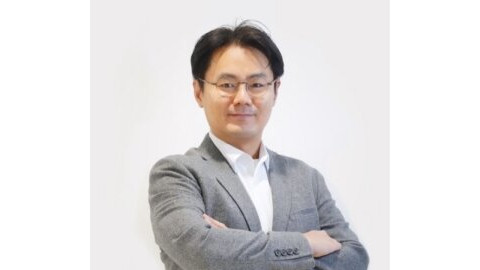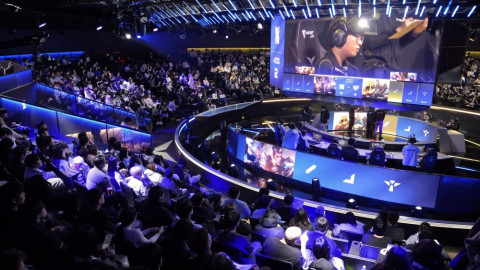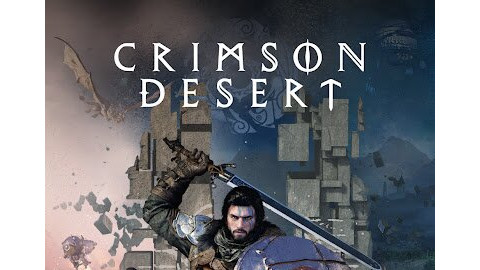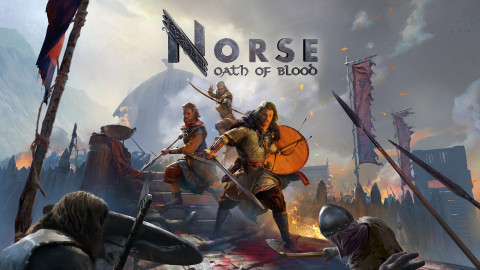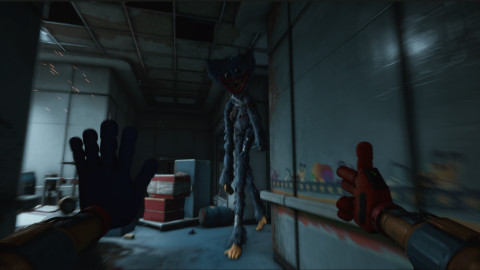
When the interview with T1’s legendary mid laner Lee “Faker” Sang-hyeok was confirmed, we were almost as concerned as we were excited. It is rare for anyone to get an hour of his time, so here at Inven we were worried as to how we were going to fill that hour, and how we would deliver our questions properly. During the coverage of the 2022 MSI Group Stages, the interview was on our minds 24/7.
However, our fears were unfounded. There was a touch of anxiety at the beginning, but as time passed, the conversation became more natural. We can't say for sure, but Faker also seemed to get more comfortable as the conversation went on. “You seem very happy when we’re now talking about money”, he even joked. Before we knew it, our hour was up.
According to Faker, the biggest motivator for him in 2013 was money. Since he had chosen an unconventional career path, his immediate focus was on making money. After he felt he had made enough, he continued to drive himself by setting a goal of "How many more championships can he win", feeding off his desire to stay at the top, as well as his sense of responsibility as a pro gamer.
Even in 2022, with countless trophies and milestones achieved, Faker still yearns and continues to strive for victory. So what’s his drive?
Icebreakers: MSI 2022

Let’s start this interview on a high note. T1 went undefeated in the Group Stage.
Our goal of going undefeated in the Group Stage was an obvious one. I feel that the Rumble Stage is when the real MSI starts, so the Group Stage is a time for us to get used to things. It was a bit uncomfortable at first to get used to the new ping. I’m fully adjusted now, and I think my performance reflects that. I think the ping was around 50 in the beginning, and now it’s more like 35, because the game definitely felt smoother on the last day. It’s gotten a lot better.
We’ve heard that you’re very sensitive to higher ping. It must’ve been very uncomfortable for you.
For mid lane, a single skillshot can determine the outcome of the laning phase, so I think there are a lot of mid laners that are also sensitive. I think I’m one of those players that are more sensitive than others. That’s why it’s hard to play at my 100%, but I have experience adjusting myself to higher ping, so I don’t think it was too difficult.
Although the tournament is still ongoing, there are a lot of disappointing factors with this year’s MSI.
Especially since MSI is held in Korea this year, seeing this much commotion made me personally disappointed in Riot. I can understand how the team that has to play the rematch can get upset. I think the rematches were due to Riot’s shortcomings. There’s also the ping issue, so this tournament is a bit disappointing.
Chapter 1: V10 and Faker’s nine years

How was your first LCK championship victory different from your 10th?
The biggest motivator for my first championship victory was money. As a pro gamer, you give up the conventional method of earning money, which is to finish school, apply for a job, and work for a steady paycheck. When I first started playing pro, the biggest motivator was to earn money by winning the championship. However, after I won championships for a few years, I felt that I’ve made enough to the point where that didn’t remain a huge motivator. From that point on, my goal was, "How many more times can I win championships as a pro gamer?" There was the aspect of challenging myself, but I was also inertially driven to keep winning. It was also my job, so I felt a sense of responsibility to be better at it.
The biggest motivator in my recent days comes from self-improvement. I have a huge need for self-improvement. That’s why, on the surface level, winning championships is my goal as a pro gamer, but if you go deeper, my priority is to work really hard at the tasks I’m given.
You’re known for the immense amount of practice that you put into the game. As you progressed in your career, your schedule became more packed. Did it affect your practice schedule at all?
Whether in the past or the present, my schedule’s always been busy. The difference is that the amount of practice I put into the game has definitely been downsized. I used to play for almost 15 hours a day in 2013, but now I only play about 10-12 hours per day. The secret behind maintaining the amount of practice is the desire to win. I hate losing games. If I fall behind, I get angry, so I put more effort into practice.
How do you retain such a competitive drive for almost 10 years?
A lot of it is because of my personality. If I become focused on something, I see the end of it. I’m also very curious by nature, so the things I always think about are along the lines of, "How can I play better?"

Physical health cannot be ignored when it comes to the longevity of pro players' careers. How’s your physical health?
Right now, my physical health does not impact my gameplay. I think my mental health right now isn’t too great, so I need to work on that. People say that mental health impacts how much pro players can focus on the game. Right now, I think I lack focus and maintaining my peak performance, so I’m working on them.
We can tell that you’re someone who continuously looks for things to improve on and works on them. What would you say is your biggest area of improvement?
In the past, I was more self-centered, someone who failed to look at the bigger picture. I think my biggest change is becoming more receptive in order to grow in different areas.
The main cause behind such a change comes from reading. I picked up reading in 2015 when I randomly picked a book, and reading helped me become more receptive and open. Changes like that helped me change my behavioral patterns. It’s also helped with my long career as a pro player.
Your hobby of reading is already well known within the community. Is there a book that you recommend?
Recently, I’ve been reading books about neuroscience and psychology, but I think those are very niche genres. It’s hard to make recommendations because the books I’ve read in the past are very stodgy, so they’re not for everyone. All the books I’ve read have helped me, and there isn't a single book that I didn’t like, so if you find a book that piques your interest, then I recommend reading it.
Have you ever had a reading experience that consoled you?
I’ve read books that consoled me, and they helped me a lot at the time. I think that the act of reading brings comfort to people’s minds. This is something that was scientifically proven. When I read, it sometimes makes me feel that it helps me destress.

We want to expand on the topic of caring for your mental health. If reading is one way to care for your mental health in your daily life, how do you take care of your mentality during matches?
I don’t need a method to take care of myself mentally during matches, because I don’t get stressed when I’m playing them. I almost never get angry or upset. I don’t get emotional because I focus on the game. When things don’t go the way I want during practice, I sometimes get sensitive and complain. In those times, I just let time take care of it naturally or just keep it to myself as much as I can.
From the perspective of mental health, the fact that you don’t let emotions affect you during matches is one of the key reasons behind the longevity of your career. Including yourself, the veterans’ stellar performances seem to be a hot topic within the community.
I think what we’re seeing right now is natural. I never thought that pro players' careers had short lifespans. It’s natural for some to retire, while others keep going. There will be veterans that are good at the game, and there’ll be those that aren’t. I never once thought the aging curve for pro players existed, because if you remove the age from the equation, it’s easy to tell who’s good and who’s not.
It definitely feels like some of the stereotypes behind the aging curve have diminished.
In the past, I didn’t know what was necessary for players to maintain their form for long periods of time. If you look at the StarCraft days, pros retired in their mid-20s. However, whether it’s physically or mentally, League of Legends requires a different set of skills to StarCraft. For example, LoL doesn’t require a lot of wrist movement in comparison to StarCraft. Factors like this are why you can play longer.
Whether it’s your micro or your macro, I believe those diminish slowly over time. That’s why I believe that there won’t be a huge difference between a player in their early 20s and those in their early 30s.
Intermission: Faker’s most (_________) moments
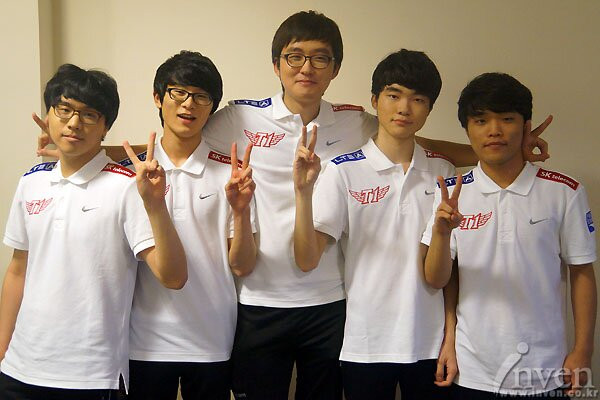
Faker’s most brilliant moment:
2013. That was when I was the most vigorous and was met with the most stimulation and new experiences, so I think that period of time is perfect to say the most brilliant.
Faker’s most peak moment:
From my memory, it’s 2013. I’m most satisfied with how I played back then.
Faker’s happiest moment:
As a pro gamer, it’s 2013.
Lee Sang Hyeok’s happiest moment:
It’s also 2013. My first championship victory is the most memorable.

Faker’s most cutthroat moment:
2016. It felt like I played in a daze, and it’s also when I experienced a lot of slumps.
Faker’s most difficult moment:
Last year. I doubted myself a lot, and there were also a lot of hard times as well. It was a very eventful year.
The moment that you’d like to go back to:
My elementary school days. I think a lot of people can agree that they were very happy back then. I want to go back to being a kid. If possible, I want to keep the memories from back then. If I don’t, I know I’ll relive my life the same way. When I was young, I didn’t study, always pushed my homework until later, and always just wanted to have fun. If I can go back, I want to study hard and even get myself a girlfriend. I want to focus on the little things that I can only do at that age. [laughs]

Chapter 2: Faker and T1
It’s not easy to be on the same team for one’s entire career. What’s the reason behind staying with T1 since your debut?
It’s just quality of life. It’s much more convenient to play in Korea, and the food here is a lot tastier. Also, from the perspective of a pro gamer, I believed that my chances of winning championships were the highest in Korea. There are a lot more reasons, but that’s the main reason.
We’d like to carefully ask this next question. There are rumors about your re-signing not being so smooth this time around.
I also believe that my re-signing wasn’t as smooth this year. Contract re-signing was never a smooth process. It may have been smooth back in 2013-14 when I didn’t know anything, but ever since 2015, the process never went smoothly.
According to Joe Marsh, you declined a 24 billion KRW [roughly $20 million] offer. If money doesn’t move Faker, then what does?
Money is the most important, but there are other conditions to consider. After weighing all those conditions, I decided to re-sign. The salary is just one of many terms to consider.

From SKT T1 to T1, the organization has also grown tremendously. Not only are there a lot of sponsors, but there’s also the new HQ building. How do you feel about the huge impact that you’ve had on their growth?
I believe that T1 are an esports organization that had already grown tremendously in their days as SKT. That’s why I honestly think I didn’t have too much influence. I might’ve influenced the org’s image as the star player, but that’s just something that happened naturally.
T1 and I have a win-win relationship. Just as I work as hard in my line of work, T1 treating me well is just part of their job. There’s nothing poetic about it.
Do you think you'll stay with T1 until the end?
You never know how contract negotiations go, so I can’t say for sure. Right now, my priority as a player for T1 is to play well in a match.
Chapter 3: Faker & esports
The status of esports continues to go up in the world. You must recognize it when you’re on various TV shows as well.
Unlike in the past, the perception of pro gamers from people in their 30-40s has become more positive, so that’s why I get asked to come on all these different TV shows and I’m treated better. I was always treated well when I first made guest appearances on these shows, but the treatment I get nowadays is much better. They’re more polite and respectful.

Source: KeSPA
Esports officially became a medal-tallying event for the Asian Games.
It’s a natural case of supply and demand. The esports market will continue to grow for the next 30-40 years. I personally think it’ll take about 10 years until esports becomes a medal-tallying event in the Olympics as well. As long as organizational fiascos like this year’s MSI don’t happen again, I think it’s very possible.
There’s also a lot of interest in esports from the Korean government as well. One of the pledges by the Yoon Administration was to implement the "home and away" system in esports.
This is hard for me to comment on, because I don’t watch a lot of baseball and I don’t know much about the system. However, as many people have said, I don’t think it’s necessary due to the characteristics of esports.
To go back to the topic LoL, you recently voiced much criticism about the current state of solo queue [on the KR server]. Have you been using the hotline at all?
Yes. If I suspect that someone is trolling, I do report it. However, it’s hard to find it if they’re clever about it. It’s a difficult problem for both Riot Games and the players. I don’t think I’ve seen any blatant trolling in recent days, but another problem is with the huge difference in the quality of solo queue games. I think it’s related to win trading, but it’s a very fickle topic, so it’s hard to talk about it.
You haven't been as vocal in the past, but your speaking up in recent days has had a positive influence. What do you think the reason is?
It wasn’t intentional. I just got really stressed out and it was an emotional outbreak. Thankfully, the fans thought positively of it, so it turned out to be a positive influence. However, I plan to exercise more discretion and be more rational. The media always says to speak out, but I don’t feel pressured by it. It’s definitely good to have the media as a form of communication, but whatever the issue is, it’s best to directly resolve it between the parties involved.

Closing thoughts
Personally, we believe that there’s a special difference between the normal person and those that have reached the top in a field. What separates Faker from the rest? In other words, what’s Faker’s greatest weapon?
For me, I believe I was just the luckiest. I don’t think I’m different from anyone else. My personality has helped me the most in my pro career, but in the end, my personality is something I created. I believe that the environment is 100% responsible for how your personality is shaped. I also became part of a great team and met great teammates, so I think that’s why I was able to play in a championship-winning environment for longer.
Not to talk about retirement, but what does Faker look like in 10 years?
I’m not sure. Even if I try to imagine it, I can’t really predict what I’ll look like. I hope to be a more prosperous, peaceful, and happy human being. I want to be someone who finds inner peace by picking up a religion. That is the most ideal and that’s what would make me happy. The location isn’t too important.
This last question is one you’re probably quite fed up with, but it’s a powerful one nonetheless. What do the fans mean for Faker?
For me, fans bring me great joy. I think the fans and I are alike. My existence is their happiness, and vice-versa. If I continue to strive to work harder for myself, then I know the fans will be happy in the end. Fans are what drive me to work hard. I’ll continue to work hard, and I’ll work hard to provide good results in this year’s MSI.
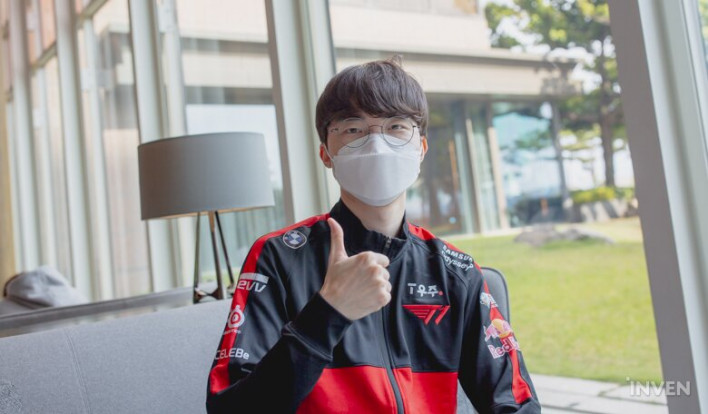
-

-

-

-

Striving for perfection to achieve excellence in esports
Sort by:
Comments :0


